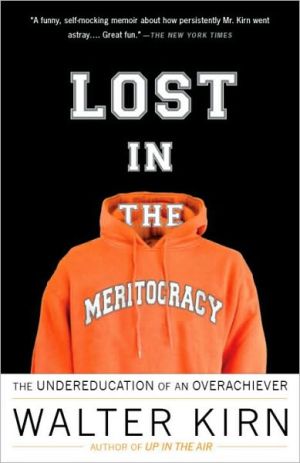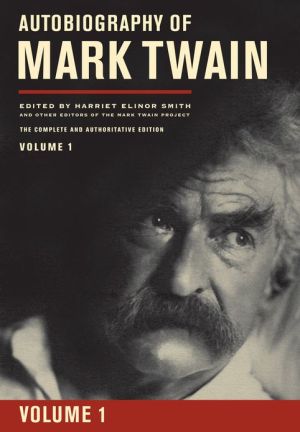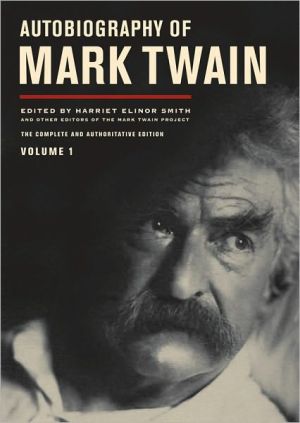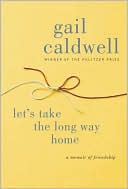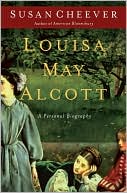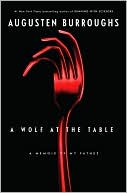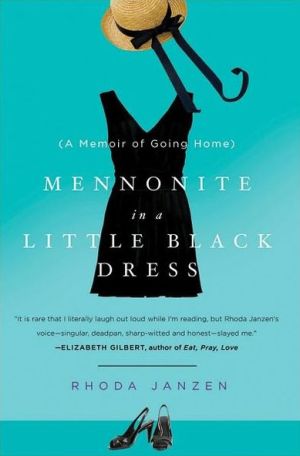Lost in the Meritocracy: The Undereducation of an Overachiever
Percentile is destiny in America.”\ So says Walter Kirn, a peerless observer and interpreter of American life, in this whip-smart memoir of his own long strange trip through American education. Working his way up the ladder of standardized tests, extracurricular activities, and class rankings, Kirn launched himself eastward from his rural Minnesota hometown to the ivy-covered campus of Princeton University. There he found himself not in a temple of higher learning so much as an arena for...
Search in google:
A New York Times Notable Book A Daily Beast Best Book of the Year A Huffington Post Best Book of the Year From elementary school on, Walter Kirn knew how to stay at the top of his class: He clapped erasers, memorized answer keys, and parroted his teachers’ pet theories. But when he launched himself eastward to an Ivy League university, Kirn discovered that the temple of higher learning he had expected was instead just another arena for more gamesmanship, snobbery, and social climbing. In this whip-smart memoir of kissing-up, cramming, and competition, Lost in the Meritocracy reckons the costs of an educational system where the point is simply to keep accumulating points and never to look back—or within. The Barnes & Noble Review The best memoirs spin out of the collision of two fronts, the weather that lives inside the writer and the weather in which the writer lives. When an intimate climate bangs against the meteorology of the outer world, the reader is twice elevated. Among recent memoirs, Frank McCourt's Angela's Ashes, J. R. Moehringer's The Tender Bar, and Barack Obama's Dreams from My Father achieved this expansive duality. Walter Kirn's Lost in the Meritocracy: The Overeducation of an Underachiever doesn't quite make it. As it tracks his strategically manipulated entry into Princeton and the "ruling class" -- all due to his ability to game the system and flatter the gatekeepers -- it occasionally scores high on satire and (suspiciously) triumphant self-abnegation. Kirn knows how to toss off lines like, "I chose to major in English, since it sounded like something I might already know," but he struggles to lash his experience to the larger world with any big -- or even little -- bangs.
Lost in the Meritocracy\ The Undereducation of an Overachiever \ \ By Walter Kirn \ Doubleday\ Copyright © 2009 Walter Kirn\ All right reserved.\ ISBN: 9780385521284 \ \ \ Chapter\ \ One\ \ On the bus ride down to St. Paul to take the test that will help determine who will get ahead in life, who will stay put, and who will fall behind, a few of my closest buddies seal their fates by opening pint bottles of cherry schnapps the moment we leave the high-school parking lot. My pals hide the liquor under their varsity jackets and monitor the driver's overhead mirror for opportune moments to duck their heads and swig. A girl sees what they're up to, mutters "Morons," and goes back to shading in the tiny ovals in her Scholastic Aptitude Test review book. She dated one of the guys awhile back and seemed amused by his clowning for a time, but lately she's grown serious, ambitious; I've heard she's decided to practice law someday and prosecute companies that pollute the air. When she notices one of the bottles coming my way, she shoots me a look of horror.\ \ "No thanks," I say.\ \ My friends seem wounded by this--aren't we teammates? We play football and baseball together. We hang out. In our high-school class there are only fifteen boys, and every summer before the bugs get bad a bunch of us pitch tents beside the river and cannonball from the cliffs into the current, sometimes splashing down in twos and threes. In the winters some of us work at the same ski hill, selling lift tickets and running chairlifts, and during haying season we form crews to help out the guys who live on farms. We talk as though we'll be together forever, but I've always known better: someday we'll be ranked. We'll be screened and scored and separated. I've known this, it seems, since my first few years in grade school, not in this town, Taylors Falls, but in Marine, a few miles down the valley, when I raised my hand slightly faster than the other kids--and waved it around to make sure the teachers saw me.\ \ A friend pushes the schnapps on me again just as I'm starting to panic about time. The test begins in an hour and a half but we're still twenty minutes from the interstate, stuck behind a lumbering Case tractor in the land of grain silos and barns where my family lives on a small farm that we cultivate, Amish style, with a team of horses, and where I spend my after-school hours splitting firewood, setting fence posts, filling stock tanks, and collecting eggs. It's been my home for several years now, but it's also a stage set, a fantasy, and one that I've never found convincing. My father isn't a farmer, he's a patent lawyer, and our family's excursion into vintage agriculture (like our conversion to Mormonism, which preceded it) is just one more phase in his campaign against convention and conformity that began twelve years ago, when he joined the 3M Corporation in St. Paul and sacrificed, as he saw it, his sacred freedom to the dictates of the herd. He's been rebelling ever since, pursuing a rugged individualism that has involved, at different times, bow hunting, mountain climbing, weight lifting, and now, in his greatest caprice to date, nineteenth-century subsistence living. But those days are almost over, at least for me. I gaze out the bus window at the countryside and wonder what could have drawn my father here other than an instinct for self-punishment. Junk cars up on cinder blocks in scrubby fields, mangled deer on the shoulders of dirt roads, lonely old folks sitting on sagging porches breathing from portable tanks of oxygen. I see myself living in New York someday, in an art-filled apartment with views of vaulting bridges, not mired in this place of wistful rot.\ \ "I already said I don't want any," I say. The guy now holding out the schnapps is named Rolf, a hulking colossus of pale Norwegian gristle who plays center on the Bluejays, our losing football team.\ \ "Afraid you'll catch my germs?" he cracks.\ \ "Everybody who drinks from the school water fountain already has your germs."\ \ "Right. Like you're some perfect Mr. Clean."\ \ "At least I shake off before I zip back up."\ \ Rolf flips me the bird. There's black crud under his fingernails. He works part-time for his uncle's excavation company, and once he learns to run a diesel backhoe he'll have job security for life. Instead of wasting my energy sparring with him, I should be concentrating on the review book like the red-haired boy across from me, the only other A student on the bus. He's a hard kid to get to know, a social ghost, forbidden by his family's harsh religion from singing holiday-related songs and forced by its stringent dietary teachings to live on sack lunches of carrots and slivered almonds. Sometimes I fear he's brighter than I am; he's certainly more studious. He works with his head down, calm and dogged, while I rely on gimmicky maneuvers such as rephrasing teachers' simple questions ("How does racial prejudice contribute to inner-city hopelessness?") into complicated riddles ("Is our conception of 'inner-city hopelessness' perhaps in itself a form of prejudice?") designed to provoke class discussions that I can dominate with my amped-up flash-card-based vocabulary. Do my ploys show intelligence or desperation? Both, I suspect. In me the traits seem fused.\ \ I watch the bottle being passed and I make my final plea.\ \ "Stop it, you guys. Today is a big deal for us."\ \ But they know this already--they just don't like the fact. The SAT isn't a reckoning they asked for. The exam was devised by strangers on the East Coast, a part of the country we associate with stockbrokers, mobsters, and fashion models. The sample questions in the review books (ART : CUBISM : : (A) scenery : play; (B) setting : ring; (C) mustache : face; (D) poem : epic) resemble none we've ever faced. Taylors Falls Public High School is a dump. Grades K through twelve are stuffed into one squat building surrounded by crabgrass ball fields full of gopher holes, and some of our teachers do little but coach sports. They wear their whistles and ball caps at their desks, paging through magazines while we, their students, pass the class hours scribbling in photocopied "workbooks" whose fuzzy type and off-key phrasings ("Among the proud peoples of the Orient . . .") suggest that they haven't been updated for decades.\ \ The St. Paul skyline stands up in the windshield as one of my classmates flings back a shot of schnapps and licks his sticky lips. "Nice little head rush. Try it, Walt. Come on." He holds the bottle by its neck and swings it in front of me like a hypnotist's pocket watch. "Getting thirsty. Getting very thirsty . . ." The numbskulls around him pretend they're going under, drooping their heads and fluttering their eyelids.\ \ "A sip," someone says. "Just one," says someone else.\ \ I shake my head. "I'm sorry. No."\ \ And so I go on to college, and they don't.\ \ \ \ \ Percentile is destiny in America.\ \ Four years after that bus ride to the testing center, I'm slumped on a shabby sofa in the library of a Princeton University eating club, waiting to feel the effects of two black capsules that someone said would help me finish writing my overdue application for a Rhodes Scholarship. I'm chain-smoking, too, and I have been for an hour--Marlboro Lights with their filters twisted off, whose butts I drop into a can of Dr Pepper spiked with Smirnoff vodka. I'm seven pounds lighter than I was in high school but not as trim and perhaps not quite as tall, my center of gravity having sunk closer to chair level. I need glasses, too. I doubt that the cause is too much reading, though; thanks to my flair for academic shortcuts and an impression I've gained from certain professors that the Great Books are not as great as advertised (and may indeed be pernicious instruments of social manipulation and oppression), I've done much less reading here than I expected. No, I blame my dimming vision, as I do my sagging physique and my reliance on chemical pick-me-ups, on a gradual neurological withdrawal from a place that no longer seemed to want me once it decided, by some fluke, to have me.\ \ "You sure you took both of them?" my close friend Adam asks. What's making him wonder is the blank legal pad resting on my lap. I should be writing furiously by now, but instead I'm compulsively clicking my ballpoint pen and nibbling a cold blister on my lower lip.\ \ "Maybe the pills were counterfeit," I say.\ \ "You haven't absorbed them. Your stomach's full from dinner."\ \ "I missed dinner. All I ate was tapioca."\ \ "Tapioca would do it," Adam says.\ \ I trust his theory; he knows his physiology. A Jewish science whiz from the New York suburbs, he ate magic mushrooms one evening, had a vision (matter is not composed of atoms but infinitesimal knots of thought), and switched the next day from premed to English literature. He ought to be reading James Joyce's Dubliners, which he'll be tested on this week, but instead he's conducting an experiment: grinding up Percocet tablets in a soup bowl and trying to smoke the powder through a water pipe. He flicks the wheel of his lighter with a thumb and steadies the flame above the pipe's bronze bowl. When the powder liquifies, browns, and starts to bubble, he sucks up the vapors with a mighty gasp that causes me to hold my breath in sympathy.\ \ I have other comrades in estrangement, way out here on the bell curve's leading edge, where our talent for multiple-choice tests has landed us without even the vaguest survival instructions. Our club isn't one of the rich, exclusive outfits, where the pedigreed children of the Establishment eat chocolate-dipped strawberries off silver trays delivered by black waiters in starched white uniforms, but one that anyone can join, where screwballs and misfits line up with plastic trays for veggie burgers and canned fruit salad. At the moment the club is floundering financially and has fewer than twenty paid-up members, including two religious fanatics who came to Princeton as normal young men, I'm told, but failed for some reason to mix and grew eccentric. Not many months from now, one will interpret a Bible passage too literally and try to pluck out his left eye in penance for some failing he won't disclose. The other will style himself a campus prophet and try to persuade a dozen "disciples"--most of them urban black kids, here on aid--to renounce their degrees just prior to graduation as a way to appease a wrathful God bent on smiting the campus with holy fire. I get along with this junior Jeremiah thanks to my experience with Mormonism, which accustomed me to apocalyptic small talk.\ \ "Why will the Lord strike Princeton first?" I ask him. "Why not the White House, say, or New York City?"\ \ "I'm only the messenger. I don't ask questions."\ \ "What about Yale and Harvard?"\ \ "They're no concern of mine."\ \ "This came to you how, this warning? In a dream?"\ \ "I was trying to solve a set-theory equation when suddenly I started writing in Hebrew."\ \ Others in the club are less expressive. They keep to themselves, tight-lipped and self-contained. One kid, a token North Dakotan (Princeton likes to boast that it has students from all fifty states), wears the same greaser haircut he brought from Bismarck and has poured all his energy for years into fronting a lackadaisical rock band specializing in heavy-metal anthems that were popular in my town, too, but which the smart set has taught me to disdain in favor of morbid British art-pop by groups such as Public Image and Joy Division. The North Dakota kid never changed his tastes, though, and part of me envies his stubbornness. Joy Division, to my ears, isn't music. It's more like the noise in a coma victim's brain.\ \ A few of my club mates scare me. I avoid them. One, a reputed physics prodigy, is catatonic from LSD, which he takes by placing the tabs on his bare eyeballs. On weekends he engages in pinball marathons that sometimes last ten hours. Strike a match an inch from his face and he won't flinch--his pupils won't even contract. Then there's the girl in the neck brace whom we call Anna, after the heroine of Tolstoy's novel. A comp-lit student, pale and heavyset, she told Adam one night at dinner that they were destined to be married. She said he reminded her of Vronsky, the dashing army officer who, in the novel, captures Anna's heart but eventually wanes in his devotion, leading to her suicide. When Adam asked the girl to go away, she flung herself off a third-floor metal railing in the atrium of his dormitory. She survived, by some miracle, and ever since Adam has been her guilty slave, buttering her toast at breakfast, keeping her coffee cup topped up, and reading out loud to her from Dostoyevsky, her new favorite writer, which may spell doom for both of them.\ \ "Feeling the buzz yet?" he asks me.\ \ I shake my head.\ \ "So what are the two best stories in Dubliners?"\ \ "The last one, supposedly, 'The Dead,' which ends with an image of falling snow that's meant to symbolize mortality, and 'Araby,' the one about a boy who sneaks out to a carnival, spends all his money, and then slinks home to bed, totally overcome by shame."\ \ "Shame about what?"\ \ "Just shame. It's irreducible."\ \ "You actually read that somewhere or you just thought it? I don't want to get shot down on this."\ \ "You won't be. 'Irreducible' is foolproof."\ \ If my buddies from Minnesota could see me now, they wouldn't have a clue whom they were seeing, and I wouldn't be able to help them. Four years ago my SAT scores launched a new phase in a trajectory that I'd been riding since age five. One morning I opened a test sheet filled with questions concerning synonyms and antonyms and the meeting times of trucks in opposite lanes, and the next thing I knew I was showered with fawning letters from half the colleges in the country. Macalester College, in St. Paul, made me a singularly tempting offer: immediate admission as a freshman. I didn't even have to finish high school. I accepted their invitation, but my plan was not to stay. In imitation of F. Scott Fitzgerald, Minnesota's most famous writer and the author of The Great Gatsby, the only serious work of literature that I managed to finish as a teenager, I wanted to go East. I wanted to ride the train to the last station. A natural-born child of the meritocracy, I'd been amassing momentum my whole life, entering spelling bees, vying for forensics medals, running my mouth in mock United Nations, and I knew only one direction: forward. I lived for prizes, plaques, citations, stars, and I gave no thought to any goal beyond my next appearance on the honor roll. Learning was secondary, promotion was primary. No one ever told me what the point was, except to keep on accumulating points, and this struck me as sufficient. What else was there? \ \ Continues... \ \ \ \ Excerpted from Lost in the Meritocracy by Walter Kirn Copyright © 2009 by Walter Kirn. Excerpted by permission.\ All rights reserved. No part of this excerpt may be reproduced or reprinted without permission in writing from the publisher.\ Excerpts are provided by Dial-A-Book Inc. solely for the personal use of visitors to this web site. \ \
\ Rachel SaslowIn his hilarious memoir, Lost in the Meritocracy, Kirn recounts the many ways that the American educational rat race betrayed him.\ —The Washington Post\ \ \ \ \ Janet Maslin…a funny, self-mocking memoir about how persistently Mr. Kirn went astray…its college stories are deft and often great fun…It's easy to believe that he experienced terrible angst under the social and academic pressures of his college years. But Mr. Kirn has reduced that pain to overly apt poetic justice: a narrative device that turns him aphasic and makes the education process run in reverse. No matter: it's clear from the authorial voice of Lost in the Meritocracy that he bounded back nicely. And he figured out how to frame and package his memories with reader-pleasing finesse, no thanks to his formal education.\ —The New York Times\ \ \ Laura MillerAs tragedies go, not getting what you want is the straightforward kind, and getting it can be the ironic variety. But there is also the existential tragedy of not knowing what you want to begin with. That's the species of catastrophe recounted in Walter Kirn's memoir, Lost in the Meritocracy: The Undereducation of an Overachiever, the witty, self-castigating story of the author's single-minded quest to succeed at a series of tests and competitions that took him from one of the lowest-ranked high schools in Minnesota to Princeton.\ —The New York Times Book Review\ \ \ \ \ Library JournalKirn, a noted book critic and novelist (Thumbsucker), writes a memoir of his educational journey, describing his travels from rural Minnesota to the upper echelon of the educational meritocracy, Princeton University. His main point is that "percentile is destiny in America." Kirn says he was able to climb so high not because of any innate gifts or knowledge; rather, he learned to play the game of scoring well on standardized tests, collecting extracurricular activities, and concentrating on class rankings. When he got to Princeton in the late 1970s, he discovered an entire subculture based not on learning and acquiring knowledge but on networking, backbiting, and "parroting" professors' words and pet theories back to them-reading assigned books was largely optional. In the end, Kirn's recreational drug use led to a case of aphasia and the need to relearn much of what he thought he knew. This indictment of America's higher education system, particularly of the elite universities, suggests that real learning takes place through experience. It is insightful, well written, and occasionally humorous and would be an excellent choice for all readers. [See Prepub Alert, LJ11/1/08.]\ —Mark Bay\ \ \ \ \ \ Kirkus ReviewsSlapdash memoir from Time and GQ contributing editor Kirn (The Unbinding, 2007, etc.). From the moment he aced the SAT at his rural Minnesota high school (he doesn't reveal his score), the author's fate, like those of his fellow overachievers, was sealed. "I have . . . comrades in estrangement," he writes, "way out here on the bell curve's leading edge, where our talent for multiple-choice tests has landed us without even the vaguest survival instructions." Kirn aims to burst the pretensions of the American ideal of meritocracy-astutely analyzed in Nicholas Lemann's The Big Test (1999)-but the narrative is too narrowly focused on the author's personal ascent through the ranks, from elementary school through Princeton and Oxford. Many of his experiences-the desire to leave Middle America and reinvent himself as a respected intellectual; his rage against affluent roommates who expected him to cough up a percentage of the expense of buying high-end furniture; his humiliation after being savaged by jealous, less-talented students in a writing workshop; his cocaine-and-sex binge with the daughter of a wealthy art dealer-make for evocative, entertaining reading, but it's unclear how they advance his argument against the meritocracy. Kirn's strengths are honesty and humor. He admits that he, like many who attend Princeton and other Ivy League schools, was a social climber driven by the desire be a part of the East Coast Elites, not by a hunger for knowledge. He says he faked his way through college, and that enlightenment came after a mental breakdown. Kirn also uses his considerable powers as a novelist to paint vivid scenes of comic debauchery. Some of the drunken, drug-addled escapades arereminiscent of The Ginger Man, but J.P. Donleavy wisely avoided the temptation to cast his antihero's drunken recklessness as a metaphor. Ill-suited for a book-length work, Kirn's premise found more effective expression as a feature in The Atlantic. Agent: Cynthia Cannell/Cynthia Cannell Literary Agency\ \ \ \ \ The Barnes & Noble ReviewThe best memoirs spin out of the collision of two fronts, the weather that lives inside the writer and the weather in which the writer lives. When an intimate climate bangs against the meteorology of the outer world, the reader is twice elevated. \ Among recent memoirs, Frank McCourt's Angela's Ashes, J. R. Moehringer's The Tender Bar, and Barack Obama's Dreams from My Father achieved this expansive duality. Walter Kirn's Lost in the Meritocracy: The Overeducation of an Underachiever doesn't quite make it. As it tracks his strategically manipulated entry into Princeton and the "ruling class" -- all due to his ability to game the system and flatter the gatekeepers -- it occasionally scores high on satire and (suspiciously) triumphant self-abnegation. Kirn knows how to toss off lines like, "I chose to major in English, since it sounded like something I might already know," but he struggles to lash his experience to the larger world with any big -- or even little -- bangs.\ At times it even feels like Kirn is channeling David Sedaris. But as a humorist, Sederis is licensed to reduce the world to clichés -- it's part of the strategy on which humor is erected. As a writer with palpably grander ambitions, Kirn should be seeking a deeper quarry.\ Occasionally he finds it. Lost in the Meritocracy succeeds best in its first obligation of authentic self-reporting as it unpeels this "confused young opportunist." But what works initially -- for example, the crucial revelation that he feels like a successful fraud -- collapses under the weight of incessant repetition. These memes-on-a-loop give the book an infomercial quality. It feels like a sales job.\ Kirn is a well-regarded novelist and reviewer who first published an excerpt from this stump of a memoir in the Atlantic in 2005. The book covers a truncated portion of his life -- albeit an intense and defining period -- from the end of high school through college, with some flashback infill. Kirn grew up in the country's midsection, and elements of a bildungsroman darken the Minnesota landscape as he recalls the difficulties of being the smart kid in intellect-dismissing, arugula-absent, low-NPR-penetration markets.\ The book opens as the author and the rest of his high school class are on a bus headed for the SATs. He knows it is "the test that will help determine who will get ahead in life, who will stay put, and who will fall behind." Kirn has long prepared for this day, and sees far past the comforting camaraderie:\ We talk as though we'll be together forever, but I've always known better: someday we'll be ranked. We'll be screened and scored and separated. I've known this, it seems, since my first few years in grade school...when I raised my hand slightly faster than the others kids -- and waved it around to make sure the teachers saw me.\ Kirn, who comes across as a less-likeable Al Gore, demurs when these losers offer him a slug. "A few of my closest buddies seal their fates by opening pint bottles of cherry schnapps the moment we leave the high-school parking lot." It's his Lisa Simpson moment.\ Kirn ended up on that bus courtesy of his narratively incomplete father, who, like some anti-Moses, led the family on a series of journeys to under-promising lands. They lived on "a small farm that we cultivate, Amish style," Kirn writes, but then points out that his father "isn't a farmer, he's a patent lawyer, and our family's excursion into vintage agriculture (like our conversion to Mormonism, which preceded it) is just one more phase in his campaign against convention and conformity that began...when he joined the 3M Corporation and sacrificed... his sacred freedom to the dictates of the herd."\ While Kirn's father -- who, interestingly, isn't named in the book -- refuses to please, Walter's problem is that he is a chronic over-pleaser: "Growing up I'd respected authority, feared punishment." A more fully realized memoir would have explored his relationship to his father and teased out his own compensatory reaction to his father's personal choices.\ Lost in the Meritocracy, which on one level is also an indictment of how easily our educational bureaucracy can be traduced by ingratiating bullshit, pivots on Kirn's assessment of his shrewdness -- his very braininess -- as a toxic gift that turned him into the undereducated overachiever of the book's subtitle. He knows a lot but understands far less; his multitude of wins is actually a multitude of sins. His academic ascendancy only amplifies his self-doubt, as does his fish-out-of-water status at elite Princeton (where, with Freudian fatefulness, his father went).\ In fact, one wonders why someone as clever as Kirn was shocked by Princeton's uppityness. He transferred there from Macalester, claiming (rather defensively) that his father played no role; it was just the vague influence of an F. Scott Fitzgerald–Minnesota nexus. But there are no surprises at Princeton: the school's reputation -- its eating clubs, its hierarchy -- is folkloric. So combined with Kirn's paternal pedigree and obvious alertness, his much-billboarded outsider status seems manipulatively willful.\ Economic disparity is another marker of Kirn's social marginalization. In a pivotal moment in Kirn's freshman year, his wealthy roommates -- or more accurately, their gilded dads -- all contribute to tricking out their suite with fancy furniture and accessories. But because he can't afford his share, Kirn is banned from even sitting on the sofa or walking on the Persian rug. "The suite was now a concentrated version of what the whole campus would come to represent for me," he writes, "a private association of the powerful which I'd been invited to visit on a day pass." When they all leave for the holiday, Kirn stays behind and completely trashes the room, down to clipping the "harp of wires under the raised lid of Peter's Steinway."\ The Princeton years, with their alcohol, drugs, sex, and almost no rock 'n' roll, constitute the bulk of the book. And though it has some fine touches, Kirn's depiction of his experience on campus (and in fact the entire book) is undermined by an assembly line of stereotypes. Consistently, in fact, Kirn's character-development skills fail to rise beyond the theme-song level of "Gilligan; The Skipper, too; a Millionaire and his wife."\ Here are just some of the one-note mannequins Lost in the Meritocracy offers:\ Kirn's high school teachers were:\ Mrs. Hannah: "A brown-eyed hippie girl with feather earrings and Navajo-like, lustrous dark hair."\ Mr. C.: "The English teacher whose wife's first pregnancy had forced him to quit the grad-school program that he hoped would turn him into a novelist."\ Mr. Ka: "Our fussy Korean accounting instructor."\ The two Mormon girls he lusted over were:\ Eliza: "Pristine and unattainable."\ Celia: "Restless and impressionable."\ His Princeton friends include:\ Adam: "A Jewish science whiz from the New York suburbs."\ \ \ \ Leslie: "A handsome blond campus prince -- the descendent of a legendary industrialist."\ Barry: "A self-proclaimed Marxist from New York City...the only child of a classics professor and a nightclub singer."\ And even his ultimate benefactress isn't spared this cruel reductionism:\ Miss Marguerite Keasbey: "The spinster heiress to a vast asbestos fortune."\ We hope for memoir, in its rawness of recollection, to break down stereotypes, not fortify them. Might one or more of these pre-packaged, shelf-stable characters have had depth below the surface? If not in the moment, did time deepen them? But none of them are remotely brought to life in Lost in the Meritocracy -- Kirn's take on Princeton is as nuanced as the Marx Brothers' take on the college life in Horsefeathers.\ The author even unwittingly admits to his character-in-a-box instinct. Describing a girl at Princeton, he writes, "I could tell she'd grown up in New York like the rest of them, and I thought I could even guess which neighborhood: the Upper West Side. One of her parents was probably a professor, of history or philosophy, most likely." At worst this is a kind of literary bigotry. At best, it's sloppiness -- or padding. So is the chronic repetition syndrome of the book's themes. Kirn felt "outcast status," his friends were "comrades in estrangement," "screwballs and misfits." He was an "addled loner."\ We are also relentlessly pounded over the head with a roll call of descriptions for the raw ambition that turned him into a soulless academic careerist and trickster.\ Four years ago my SAT scores launched a new phase in a trajectory that I'd been riding since age five.\ A natural born child of the meritocracy... I lived for prizes, plaques, citations, stars, and I gave no thought to any goal beyond my next appearance on the honor roll.\ I rely on gimmicky maneuvers such as rephrasing teachers' simple questions...designed to provoke class discussion that I can dominate with my amped-up, flash-card-based vocabulary.\ If my schooling had taught me anything, it was how to mold myself -- my words, my range of allusions, my body language -- into whatever shape the day required...\ And then, in case we didn't get the message, the prospect of graduation reveals it yet again: "The only game I'd ever learn to play -- scaling the American meritocratic mountain -- was, I feared, about to end."\ To be fair, there are some crackling good lines in the book. Kirn wonders if a student's "Quaker passion for justice -- so keen in the matter of black South Africa -- extended to individuals." He and his fellow English majors "skipped straight from ignorance to revisionism, deconstructing a body of literature that we'd never constructed in the first place." And, aphoristically, "Anxiety over poor grammar ensures poor grammar."\ As the book concludes, Kirn's gnawing self-doubt climaxes in a breakdown. He becomes aphasic -- "cracks-up," in a nod to Fitzgerald -- and recovers through a combination of the usual ministrations: he writes a play, he meets a woman, he spends hours in bed repeating words and their definitions in alphabetical order. He also blows a Rhodes scholarship and wins the Keasbey -- a grant from a quirky foundation that appreciates his oddity and sends him off to Oxford.\ But before he leaves for England, he finds himself back home and feverish. Conveniently, he's "standing before the bookcase containing my mother's classics for the masses." (Apparently, his gift for condescension hasn't been damaged by his travails.) Rather than read to win, he decides to read for its own sacred sake; he lets the books "absorb" him: "And so, belatedly, haltingly, accidentally, and quite implausibly and incredibly, it began at last: my education." So that's the deal. Boy meets books. Boy makes books work for him. Boy has a breakdown. Books meet boy.\ What's singularly absent from Lost in the Meritocracy, though, is any serious consideration of the nature of the meritocracy itself. The word is of recent vintage; Michael Young coined it for his 1958 book, The Rise of the Meritocracy, in which it wasn't exactly used as a compliment but as a caution for a world in which a gifted elite was being pitchforked out of power by the masses.\ It's not clear what Kirn thinks of the concept his book rotates around. Does he believe that a pure meritocracy is possible or desirable? Is he troubled about the Darwinistic fate of those who are losers in the American Idol competition for talent? What about affirmative action, athletic scholarships, and legacies (which he benefited from)? Where does he fit in Malcolm Gladwell's theory of Outliers, which raises doubts about the self-made success story? For such a culturally connected social critic, these are curious oversights. Had Lost in the Meritocracy loosened the knot that is looped and relooped around the neck of its subject -- and widened its aperture -- it might have encircled larger themes, and been a better book. Kirn is surely capable of it. --Adam Hanft\ Adam Hanft is a nationally known authority on consumer marketing, business strategy, and social trends, and the founder and CEO of Hanft Unlimited. He blogs for the Huffington Post, The Daily Beast, and Fast Company and is a frequent commentator on National Public Radio's Marketplace. He is the co-writer, with Faith Popcorn, of The Dictionary of the Future. You can follow him at twitter.com/hanft.\ \ \
